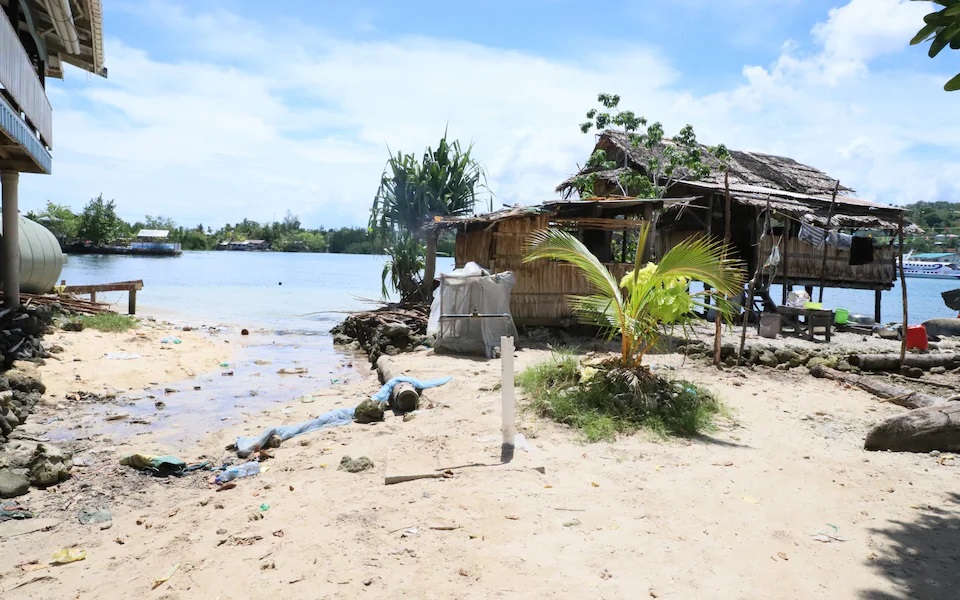Rising sea levels are eroding the Solomon Islands. It serves as a red flag for the global community
By Nicola Smith, Asia Correspondent
At first sight, Lilisiana is a picture of natural tranquillity: a small cluster of wooden thatched homes perched on stilts above the gently lapping turquoise waters along the Solomon Islands’ coastline.
Louise Wale, an English teacher, has lived here happily with her husband, Vincent, all her life. But now they watch with alarm as sea water creeps a little higher every year, sweeping driftwood and plastic debris across the floor of their kitchen during high tides that swamp the entire village.
A decade ago, it would have been unthinkable for Pacific waves to reach the steps leading up to the lemon and pale blue walls of the Catholic church some 50 metres behind her home, but now it happens several times a year.
“Everything floats, when the high tides come,” she said. “And the rubbish comes in and stays when the tide goes back out. It comes in our rooms and stinks the place out.”
Ms Wale’s grandchildren can still play happily around the tropical vegetation lining the beach. But they run past a road that has now eroded into the sea and a graveyard where tombstones have been swallowed by the white sand. Understandably, she fears for the children’s long-term future.
Lilisiana’s residents believe climate change is behind the constant floods. “It’s the ice melting,” said Ms Wale. “Maybe we have no choice but to move. But we have nowhere to go.”
Her unease about rising sea water is backed with hard scientific facts from bodies including the World Bank and the Solomons’ own environment ministry.
One landmark peer-reviewed study published in the Environmental Research Letters journal in 2016 produced the first scientific evidence that the Solomon Islands has been experiencing sea level rises at almost three times the global average, around 7-10mm per year, since 1993.
Using time series aerial and satellite imagery from 1947 to 2014 of 33 islands, along with historical insight from local knowledge, the study identified five vegetated reef islands that had already vanished under the waves.
“There are another six adjacent islands which have been severely eroded and unfortunately are on track to also being lost,” Dr Simon Albert, a marine ecologist at the University of Queensland and one of the study’s authors, told The Telegraph.
On the forefront of climate change
The high waters drowning the Pacific archipelago that stretches across 11,000 square miles northwest of Vanuatu occur both because of climate change and trade winds that blow through the western Pacific. Their impact is more acute because of the high number of low-lying communities.
Dr Albert warned the situation globally was getting worse. “It’s no longer a question of if this is going to happen, it’s when. It’s just a case of will we see a metre of sea level rise this century or will it be early next century?”
Experts say that the experience of the Solomon Islands should serve as a warning for the world.
“The Solomons is an indicator of what the rest of the world can expect in the latter half of this century. That’s why it is so unique and important to study,” Dr Albert added. “There is a lot that the western world can learn from these people and these experiences as they rapidly adapt.”
Being on the forefront of the climate challenge has made the government in Honiara, the capital of the Solomons, a frontrunner in developing internal migration policies.
According to the World Bank in March, “cyclones, flash floods, and other weather-related events have already forced about 26,000 people within the Solomon Islands to relocate since 2008,” a figure that translates to about 3 percent of the population.
The crisis has also raised the question of how the international community can help, first by radically reducing its own carbon footprint, and secondly through financial support to mitigate the damage and compensate for already destroyed livelihoods.
The need for the world to step up was acknowledged by James Cleverly last month, on the first visit of a British foreign secretary to the Solomon Islands in living memory.
“If we don’t get it right here, literally bits of this country will disappear underwater. Some already have, so it is absolutely logical to respond to some of those serious environmental concerns,” he told The Telegraph.
Matthew Wale, the MP for Lilisiana and the surrounding area in Auki, Malaita province, said about 80 percent of his constituency was in danger of disappearing.
“Climate change is the big one for us and for my electorate it is existential,” he said, adding that a major challenge lay in the reluctance of coastal area inhabitants to face the expensive and complicated task of leaving their homes to move inland.
While international grants exist to address the climate crisis, finding the channels to deliver it to the families who need it most is a missing link in the process.
“One of the things Britain could be doing would be helping set up a unit here to give us technical capacity to be able to actually negotiate and access climate resources,” said Wale.
Moves are already afoot with the Solomons government to appoint a British finance expert as part of a cross-government package of UK support on environmental protection and climate change, said High Commissioner Tom Coward.
“We have offered a climate finance adviser to the government and this ties into our global work, which is about making sure that the global private finance funds are utilised in the best possible way in the Pacific,” he said.
“You have got small governments that can’t have huge teams that are dedicated to writing proposals for these funds and yet you have some of the most pressing adaptation challenges.”
‘A red flag for our global community’
The Royal Navy is also playing an environmental role as it patrols the Pacific.
On a port call to Honiara last month, Michael Proudman, commanding officer of the HMS Spey, one of two Batch-2 River-class patrol vessels deployed to the Indo-Pacific, stressed that climate change, marine biodiversity and maritime security assistance lay at the heart of the UK’s soft power projection.
“Part of our mission out here is environmental, to try to support environmental challenges and issues that some of our partners and friends have,” he said.
The ship, equipped with green credentials that allows it to sail in all emission control areas, has already been tasked with sampling the characteristics of water columns to monitor changes in marine biology.
“An important part of my mission is not to come and do what I think needs doing, or what the Navy or the MOD thinks needs doing. It’s to come and listen and say, ‘how can we help you?’” said Commander Proudman.
For now, Solomon Islanders at ground zero are striving to find their own solutions.
Joe Hereau, deputy leader of Malaita’s provincial government, said the authorities were considering sea walls as a potential fix for low-lying communities like Lilisiana. “We are adapting our policies to capture more funding,” he said.
Phillip Subu, a youth activist in Auki, said he was working on a natural resources project to improve food security along the coastlines, where soil salinisation was increasingly a problem, and on exposed mountainsides.
“We are trying our best to encourage reforestation and farming of traditional taro species which are resistant to climate change,” he said.
But the sense of frustration is growing at inaction from the outside world, particularly among the Solomons’ younger generations.
In a video address to the Pacific UK High Level Climate Dialogue ahead of the 2021 Cop26 climate change summit, activist Gladys Habu filmed herself submerged in the ocean where her grandparents’ home, Kale island, once stood.
“This personal loss prompted my journey as a climate advocate,” said Habu, 26.
“Please come and stand in our seas and feel for yourself the urgency and importance of your responsibility.
“The loss of my beloved Kale is my line in the sand and should be a red flag for our global community. Our future is not the only one at stake. I fear for our children and their children to come,” she said.
SOURCE: THE TELEGRAPH UK/PACNEWS


















